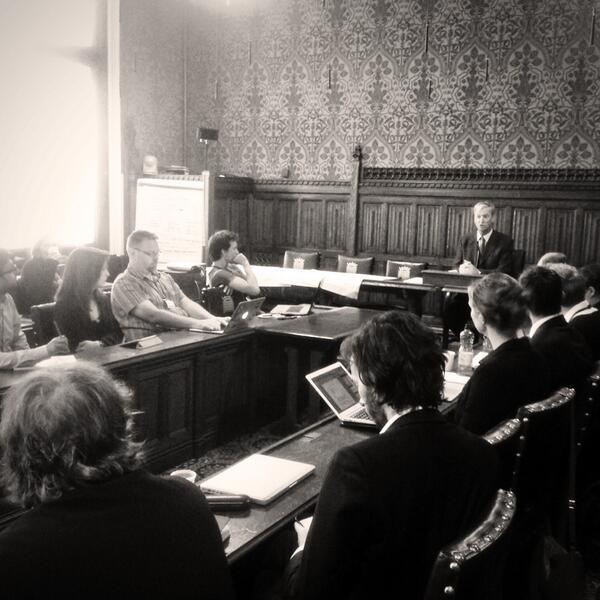
This post was written by Stevie Benton, Wikimedia UK’s Head of External Relations
On Tuesday I was fortunate enough to attend a round table event hosted by the Speaker’s Commission on Digital Democracy at the House of Commons.
The opportunity came about as the result of the work that Wikimedia UK is doing with Demos in attempting to crowdsource a submission to the Commission on the theme of digital scrutiny. (If you haven’t participated yet, please get involved here, it’s open to everyone. Simply click the edit button and get stuck in.)
The session brought together people from the Commission with technology experts and activists to examine how digital technologies can encourage participation in the democratic process.
Something that was reinforced very quickly was the important distinction between between government – the collection of elected representatives that write and enact legislation – and Parliament, in this case the body as a whole, including the infrastructure and systems, and which was our main focus.
A number of themes emerged from the workshop but there were two that left the deepest impression upon me.
Firstly, that for digital democracy to work there needs to be a level of trust on the part of parliament – citizens must be trusted to make meaningful contributions to the debate and this means opening things up and encouraging participation.
Secondly, that when we break down the phrase “digital democracy” we realise that the digital part is actually pretty easy. There are plenty of tools that exist that could be successfully utilised to support democratic engagement, and building new ones if they were required wouldn’t be too difficult (relatively speaking, of course). It’s the democracy bit that’s difficult.
My own take on this is that we need to move away from the widespread feeling that democracy comes down to making a mark on a ballot paper every few years. For democracy to be effective, participation needs to shift away from the ballot box and into the every day processes that form a functioning and mature democracy. But those taking part need to be assured that their contribution is are meaningful and valued, even if their views don’t always win out.
There is a long way to go here before we get close to realising the potential that digital technologies offer to democracy. But the Commission is very serious about pushing forward change and opening up the democratic process to wider engagement through the use of digital. They should be applauded for this and, as citizens, we should be prepared to contribute our efforts towards making this successful.
For further reading, I recommend this excellent blog post by James Smith of the Open Data Institute. James was in the same working group as myself and his contributions to the debate were particularly insightful.
The Speaker’s Commission on Digital Democracy will be publishing resources from the event on their website shortly.





